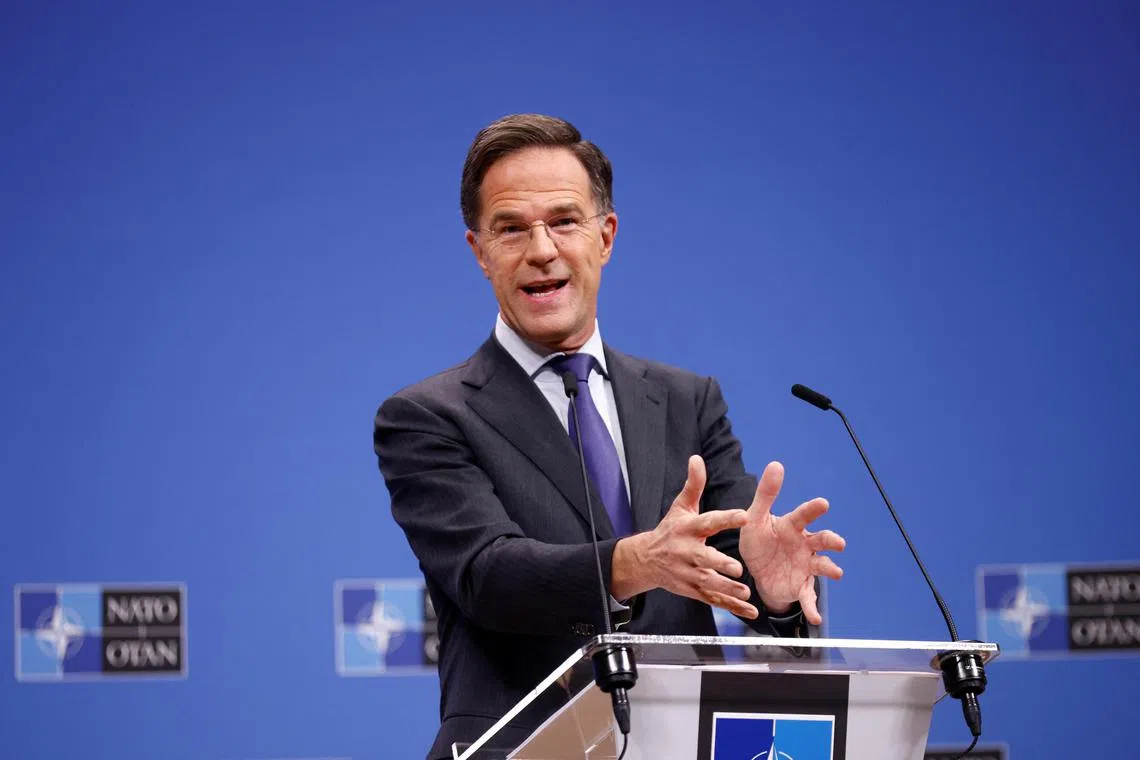Nato chief calls for ‘turbocharged’ defence surge to avoid ‘big war’ with Russia
Sign up now: Get ST's newsletters delivered to your inbox

Mr Mark Rutte on Dec 12 delivered his first major speech since taking office as Nato secretary-general in October.
PHOTO: REUTERS
BRUSSELS – Nato chief Mark Rutte issued a stark warning on Dec 12 to “turbocharge” defence spending, saying European nations were not prepared for the threat of future war with Russia.
“We are not ready for what is coming our way in four to five years,” Mr Rutte said, in a keynote address in Brussels, his first major speech since taking office as Nato secretary-general in October.
“Danger is moving towards us at full speed.”
Russia’s war in Ukraine has jolted the Western military alliance to strengthen its eastern flank and ramp up spending.
But despite increases in defence budgets, Nato countries still do not match Moscow’s arms production.
“Russia is preparing for long-term confrontation. With Ukraine. And with us,” Mr Rutte said.
“What is happening in Ukraine could happen here, too.”
The former Dutch prime minister insisted there was no “imminent military threat”, but said Nato needed to move “faster and fiercer” to bulk up defences and stave off the risk of future conflict.
“We can prevent the next big war on Nato territory,” he said.
“It is time to shift to a wartime mindset. And turbocharge our defence production and defence spending.”
The plea for action comes as Russia is making gains on the front line in Ukraine against Kyiv’s fatigued forces.
“Every day, this war causes more devastation and death. Every week, there are over 10,000 killed or wounded on all sides in Ukraine,” Mr Rutte said.
“Over one million casualties since February 2022.”
Nato’s 32 countries in 2023 set a minimum level for defence spending of 2 per cent of gross domestic product (GDP).
This year, 23 members are set to reach that figure – but Mr Rutte insisted the target would need to go up.
“I can tell you, we are going to need a lot more than 2 per cent,” he said.
‘Sacrifices’
“Russia, China, but also North Korea and Iran, are hard at work to try to weaken North America and Europe,” Mr Rutte said.
“We are not at war. But we are certainly not at peace, either.”
The clarion call comes as Donald Trump readies to take power in military superpower the United States.
Trump has told Nato allies to ramp up defence spending if they want Washington to still have their backs and has mooted a new target of 3 per cent of GDP.
Diplomats say the alliance is discussing coming up with a new goal at a summit in The Hague in June.
But boosting defence spending is a big challenge for some major European economies, with Spain and Italy still falling well below 2 per cent.
“If we don’t spend more together now to prevent war, we will pay a much, much, much higher price later to fight it,” Mr Rutte said.
“During the Cold War, Europeans spent far more than 3 per cent of their GDP on defence. With that mentality, we won the Cold War.”
He urged citizens of Nato countries to tell politicians: “You accept to make sacrifices today so that we can stay safe tomorrow.”
Despite a raft of initiatives to try to bolster European arms output, Mr Rutte said efforts by Western countries to build up their militaries are far behind those of Russia and China.
“We are not where we want to be,” he said.
“Russia and China are racing ahead. We risk lagging behind. This is very dangerous.”
He urged governments to work closer together and place “big orders and long-term contracts”.
Industry needs to “dare to innovate and take risks”, and should put in extra shifts and production lines, he said, warning that Europe’s defence sector was “too small, too fragmented and too slow”. AFP


